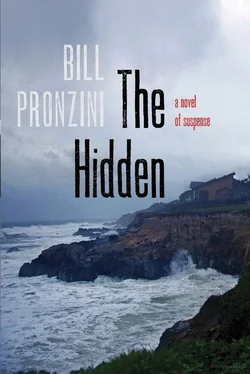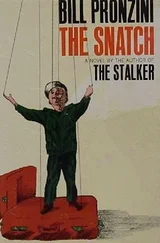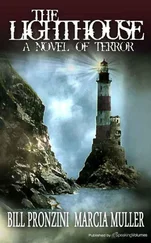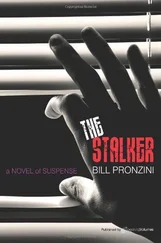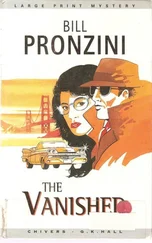Streamers from a dense offshore fog bank laid a misty sheen over the windshield, so he kept the wipers going. No problem. He liked the fog even when it slicked the road surface, got thick enough, as it was doing now, to hide some of the inlets and most of the ocean. He didn’t even mind the storms, like the one yesterday, though he didn’t do much pleasure driving when the wind and the rain got too heavy. Hazardous. Some drivers took chances no matter what the conditions; you just didn’t know who might be out in rough weather, some idiot with a two-thousand-pound lethal weapon in his hands putting other folks’ lives in jeopardy.
Nice and warm in the car, with the heater going. He had the radio going, too. You couldn’t get much on it up here except a couple of local stations and the one out of Santa Rosa; the others on both AM and FM would tune in for a while, clear and sharp, and then fade out. The station he liked best played a mix of golden oldies, R&B, and country-western. Little bit of everything, and not much talk.
Another he liked sometimes when he was in the right mood was the religious station, but it was still playing Christmas music today, “O Little Town of Bethlehem” shot through with static when he tuned in. Carols he could do without, but he didn’t mind old-fashioned gospel music now and then; and some of the Bible quotations and sermons were worth listening to and thinking about. But he couldn’t stand the loudmouths who came on and started jabbering about politics and family values and gay marriage, telling you what God said was right and wrong and good and evil and what you should believe and how you should behave. That was why he didn’t listen to the station very often. Besides, it was one of those that kept fading out.
One thing he avoided completely was local news broadcasts. He’d listened to one once, after those two kids down by Fort Ross, and he hadn’t liked what they’d said about him. They didn’t understand anything about his mission. Said he must be crazy, an off-the-rails vigilante playing God. Crap like that upset him because it didn’t have a speck of truth. How could somebody who’d never met him, didn’t have a clue about what went on inside his head, know what kind of man he was? Impossible. So why should he be subjected to their bullshit opinions?
Well, out of hearing, out of mind. Driving, now, that was something worth paying attention to.
As far as he was concerned, driving topped the list of life’s enjoyments. It relaxed you, took your mind off things that bothered you, kept you focused. And when he drove the coast highway, he felt as though he were traveling back and forth along the edge of the world. Yet there was never any sense that he might drop off into nothingness. Just the opposite. He felt anchored for the first time in his life, as if he and the car were running on invisible tracks. As if he were safely locked in and yet totally free at the same time, and that if he wanted to he could drive along the edge of the world forever.
A vehicle going faster than he was came barreling up behind him, its headlights stabbing fuzzy-bright through the mist and gathering darkness. The lights closed in, steadied like huge yellow eyes in the rearview mirror. Tailgater. There were a lot of them on the highway, residents who’d driven it for years and knew the twists and turns better than he did, reckless kids and race-driver wannabes; but if this one had come flying up on a sheriff’s cruiser or a highway patrol car, it would’ve bought him an unsafe-driving ticket damn quick.
Under the circumstances the safest thing for him to do was to pull over and let the idiot pass. But there was no place to do that here, on a twisty section hemmed in by trees on both sides. Increasing his speed slightly didn’t get the other vehicle off his tail, either.
Half a mile of this, the constant crowding, started to piss him off. He thought about slowing down to twenty-five or so, making a challenge thing out of it, and he might have done that if the road hadn’t straightened out as he came through a tight curve. Double yellow line, no passing, but that didn’t stop the other driver; the glaring headlights swung out and around, the dark shape of a pickup roared by and then cut in in front of him, not quite close enough to force him to brake. One of the pickup’s taillights was out; the other flashed like a bloody eye and then began to dwindle as the driver gathered speed.
His first impulse was to give chase, catch the bastard, force him off and confront him and then terminate him. But an impulse was all it was, intense for a few seconds, then overcome and gone. Giving in to road rage was foolish, dangerous. The pickup’s driver had committed a stupid traffic crime, but that wasn’t sufficient cause for him to take action. Crimes against nature were the only cause for him to use deadly force. Today, or at any time, ever. If he started eliminating individuals who were guilty of other crimes, that would make him just what society believed he was—an out-of-control avenger, a vigilante playing God.
He slowed down, relaxing again, recapturing the good feeling he’d had before the tailgater showed up. The radio was playing a Willie Nelson song, something about blue eyes crying in the rain. Not exactly cheerful, but he liked it anyway. He liked Willie’s music. Mostly gentle, meaningful songs about love and loss, happiness and sadness, sin and redemption—genuine human emotions. Old Willie had a reputation for being an outlaw, but he really wasn’t. Any more than he himself was an outlaw. That was something the two of them had in common—mislabeled outlaws.
The fog kept thickening, feelers of dark gray wrapping themselves around the pines. The way it was doing that reminded him of the Christmas trees his mother put up in their house when he was a kid, the same blue spruce with the same decorations every year. Tinsel … she loved that glittery silver tinsel. Garlands, too, white garlands. Silver and white woven through and around the thick-needled branches. And blue lights and blue ornaments, she never wanted any other color but blue.
Once, when he was nine or ten, he’d brushed against the tree accidentally and knocked off some tinsel and a blue sparkly bell, one of her favorite ornaments, that shattered when it hit the floor, and she heard the noise and came running in and screamed at him, “You clumsy little shit. Why can’t you watch where you’re going? Well? What’s the matter with you, standing there like that? Clean it up! How many times I got to tell you to clean up your messes?”
Bad memory. He didn’t like thinking about his mother, long dead and gone and unmissed. Or any part of growing up in that hardscrabble West Texas town. He’d come a long way since he left when he was eighteen to join the army and he wasn’t ever going back, not for any reason.
The highway straightened again into a long reach. Ahead on the seaward side, the land stretched out to a wide, flat-topped promontory like a fat handless arm reaching into the ocean; a ribbon of blacktop traced over to a parking area and lookout, and there was a sign at the intersection that said Scenic Point. He’d gone out there a couple of times. Nice view from the lookout; you could see the contours of the shoreline for quite a distance in both directions, and just offshore a massive hunk of shale shaped like the prow of a ship reared up out of the sea.
A car was parked on the lookout, facing seaward. Tourist taking in the view? Not too likely, this time of year and this late in the day. Somebody with car trouble, maybe. If that was it, he might be able to help. He braked and turned off onto the blacktop.
Low-slung sports car, he saw as he neared. Porsche, looked like. He didn’t much care for cars like that, or the kind of people who drove them. Too fast and reckless, no regard for anybody else’s safety, like that asshole tailgater. This one was black and had familiar lines, but there were a lot of them like this zooming up and down the coast highway.
Читать дальше
